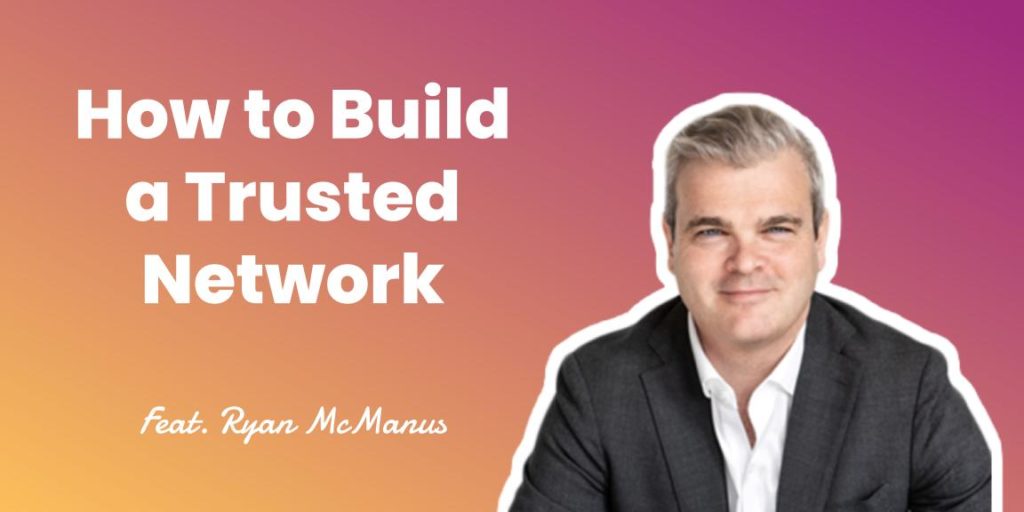

As your career progresses, relationships become increasingly important. According to Ryan McManus, it also becomes more important to have a network that trusts you.
Ryan is a founder, investor, advisor, and board director in the digital transformation and emerging technology space. He’s the founder and CEO of Techtonic, the enterprise investment agility platform, managing director of Inflexhn Partners, an advisor to Fortune 500 organizations, governments and non-profits, and board director with Nortech Systems and the National Association of Corporate Directors, New York chapter.
Ryan has built and deployed new digital businesses for over 25 years including serving as President and Head of Partnerships and Corporate Development for EVRYTHNG, and founder of Accenture’s digital transformation business after roles as the Accenture Strategy COO and a leader of the firm’s Corporate Strategy practice.
I interviewed Ryan about the importance of his network throughout his career and how he builds relationships over time. He shared how to build trust, why it’s critical to gain clarity on people’s goals, and how to utilize writing and speaking to grow your network and build relationships.
Ryan says that a trusted network is a force magnifier over your capabilities and expertise. He emphasizes that trust is the most critical factor.
People need to trust your capabilities, that you will deliver on what you promise, and that you act ethically and with clear intentions, he says. Your trusted primary relationships may then lead to further introductions into extended networks. Many of Ryan’s opportunities throughout his career have come about through these introductions.
“We’re taking care of the reputations of the people in our network”, he says. “When you ask people to open their networks to introduce you, you need to realize that you are representing the people who referred you and to do everything you can to protect their relationships, or your network will be less open to helping”, Ryan warned.
I asked Ryan how to build trust with your network. He shared some straightforward and direct advice: “Be capable of doing what you promised to do, and then do what you say you’re going to do. Don’t overstate your capabilities. And be clear about what you can’t do.”
Some people are too modest to highlight their accomplishments, so I asked Ryan for tips on marketing and communicating successes. He recommends pointing to real examples and sharing tangible data on the outcomes one has achieved and their contributions to those outcomes:
“As one’s career progresses, it becomes clearer whether or not you actually have delivered. There are more and more ways that people can understand what impact you’ve made. It’s less about what you claim to be able to do, and more about ‘what examples can you point to which describe your impact?’”
Ryan emphasizes the importance of helping others. “People remember those who have helped them. They might not understand the contribution right in the moment, but eventually people look for opportunities to give help in return, or to help others in turn”, he says.
It starts with gaining clarity on people’s goals. This could be a business objective, career development objective, or even a personal goal.
It’s a two way street, Ryan says. It’s difficult for people to help you if they’re unclear on your direction and ambitions.
“When you’re asking for help, you’re asking people for their time, and in the case of an introduction, their reputation too. The easier you make it for them to understand your goals, the easier it is for them to make connections and find the opportunities.”
Ryan has published articles with Harvard Business Review, Duke Corporate Education, the National Association of Corporate Directors, Accenture, and many more. He says that his primary strategy for creating content is to address the challenges facing the organizations and leaders with whom he works, and as such to provide actionable and helpful recommendations, frameworks and tools.
Ryan doesn’t expect any immediate returns from his writing or speaking, but he’s found that over time, such content is important to presenting your expertise and it distinguishes you as someone with a unique and expansive point of view.
The most satisfying part of writing and speaking is when people share that the materials were helpful, which in turn can lead to new opportunities and introductions. Ryan also regularly invites his network to attend or even to co-present with him at speaking engagements.
Connect with Ryan on LinkedIn and learn more about his work on his website.
Send us a note with your use case: go@strata.cc
Copyright Strata 2022.